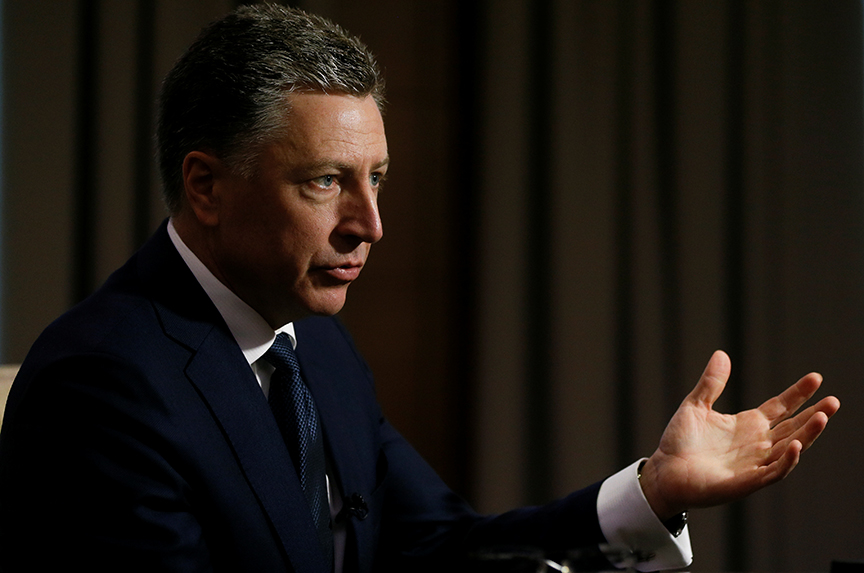 Even as Russia escalates military action in eastern Ukraine, diplomatic momentum to resolve the nearly four-year-old conflict has diminished, says Kurt Volker, the US special representative for Ukraine negotiations.
Even as Russia escalates military action in eastern Ukraine, diplomatic momentum to resolve the nearly four-year-old conflict has diminished, says Kurt Volker, the US special representative for Ukraine negotiations.
Pointing to a significant increase in December in violations by Russia of what’s often referred to as the “ceasefire-in-name-only” Minsk agreement, Volker said: “There’s been no movement by Russia toward actually ending the conflict.”
“In fact,” he added, “they withdrew their military officers from their consultative body aimed at reinforcing the ceasefire and in sharing information about what needs to be done on that. There have been multiple contacts in the Normandy format [Russia, Ukraine, France, and Germany] and no progress there either.”
The fighting in the Donbas has already killed more than 10,000 people and displaced an estimated 1.6 million.
Volker heads into his fourth meeting with Russian counterpart Vladislav Surkov on January 26 to try to chisel out even a crack in the deadly Donbas stalemate.
This will be the first meeting between the negotiators since the United States announced it would be providing Kyiv with Javelin anti-tank weapons.
Volker is not waiting nervously to see if Russia follows through on threats to escalate military action. Despite a brief respite this week, he said, “they’ve already done it.”
He would like to see more diplomatic urgency directed toward the conflict and a willingness from the West to become more creative with sanctions on the Kremlin, should peacemaking efforts continue to fall flat.
“We need to keep increasing the costs,” he said. “No one’s going to accept an occupied territory or another long-term conflict, and the costs of maintaining that will continue to escalate, including sanctions, including support for Ukraine overall.”
It’s already costing Moscow plenty to maintain much of the civil administration in Donbas in addition to its military operations, he added.
Volker, named to the post last July by US Secretary of State Rex Tillerson, will meet Surkov in Dubai, since the Russian businessman is on the European Union (EU)’s blacklist for his role in the annexation of Crimea and cannot enter EU territory.
This meeting will take place against a backdrop of events demonstrating the stark contrast of what is possible in eastern Ukraine, and threats to a peaceful future.
For example, January 23 was a day of remarkably few ceasefire violations. Monitors from the Organization for Security and Co-operation in Europe (OSCE) tallied only one explosion in the Luhansk region, compared with 230 the previous day. Meanwhile, the Ukrainian government passed a new law aimed at the reintegration of Donbas, calling the territory “temporarily occupied,” and naming Russia as the aggressor. In response, Moscow accused Kyiv of escalating the conflict, calling the measure “preparation for a new war.”
Volker, a former US ambassador to NATO and now executive director of the McCain Institute for International Leadership, arrived in Brussels on January 21 to brief NATO and EU officials on his mission. On January 23, he visited Ukrainian President Petro Poroshenko in Kyiv and the frontline in Donbas.
Protecting monitors shouldn’t need blue helmets
A Russian proposal to put United Nations (UN) peacekeepers in the disputed region has been virtually sunk by disagreements over the physical placement of the blue helmets. In his meeting with Surkov, Volker will probe whether there is any willingness on the Russian side to compromise.
However, as a sign of the intransigence that is complicating peacekeeping ideas, Volker said that when he sits down with Russian representatives, he still routinely has to face their blunt denials that Russian military personnel are even present in the conflict zone. Moscow continues to urge Ukraine and the international community to deal directly with the proxy governments that were set up by the Russians—the Luhansk People’s Republic and the Donetsk People’s Republic.
The Russians suggest, Volker explained, that UN peacekeepers would protect OSCE monitors, who often get weapons pointed in their faces from the local militias. “The problem is that they [would be] protecting them from the forces that Russia controls,” he said with some exasperation. “There’s no need for that and it is legitimizing the presence—and in fact negotiating that presence—with those forces that Russia controls with Russia pretending that it’s not there. That’s just an untenable formula.”
Javelins plugging Kyiv capability gap
Not surprisingly, Volker does not view the provision of anti-tank weapons to Ukraine as ratcheting up the military nature of the conflict; he claims by boosting Kyiv’s defense capacity, the opposite is true. “What it could do…is if Russia were to contemplate further inroads into Ukraine, that it would be more costly to do so,” he explained. “So. it’s basically aimed at deterring an escalation of the conflict.”
Volker said he will point out—again—to Surkov that the situation in eastern Ukraine is not working out well for Moscow, with the intent of generating “fresh thinking” from his counterpart. However, what he will not do is give up. “We can’t we can’t just sit here and say ‘Oh well, that’s too bad.’ Not at all,” he said. “Just like with the Baltic States, we have to proactively say ‘unacceptable—we’re not going to buy it.'”
Teri Schultz is a Brussels-based freelance journalist. Follow her on Twitter @terischultz.
Image: "There's been no movement by Russia toward actually ending the conflict" in eastern Ukraine, said Kurt Volker, US special representative for Ukraine negotiations. (Reuters/Valentyn Ogirenko)

